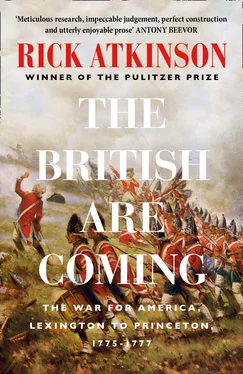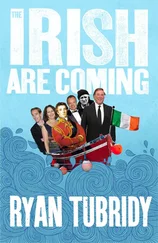Uneasy lay the head, but at six forty-five a.m. on Saturday, June 26, after pardoning debtors in the Portsmouth jail and dispensing a few royal favors—including £250 for the local poor and £1,500 to be divided among the dockyard workforce—the king climbed into his chaise for the return to Kew. A few final gun salvos boomed, and happy subjects ran after his cavalcade as it rolled beyond Portsea Bridge. In Godalming he emerged from the cab to stand in flowers piled to his knees. A band crashed through “God Save the King,” sung with such fervor by the locals that George wept, then joined the chorus.
“The king is exceeding delighted with his reception at Portsmouth,” wrote the painter Joshua Reynolds, president of the Royal Academy of Arts. “He was convinced he was not so unpopular as the newspapers would represent him to be.” Foreign ambassadors in London who had been invited guests in Portsmouth sent reports to their capitals with admiring descriptions of Britain’s might, just as the government had intended. Particular note was taken of the courier who set out for Versailles from the French envoy’s house in Great George Street; that dispatch reportedly described the review as “most noble.”
Later in the year, the Portsmouth spectacle would be mounted as a stage production by the celebrated actor David Garrick, who hired a Parisian set designer to convert the Theatre Royal in Drury Lane into a dockyard and anchorage. Toy cannons popped, model ships sailed on billowing fabric that simulated a rolling sea, and the cast pressed toward the footlights. “Rule, Britannia!” they sang. “Britannia, rule the waves.”
The celebratory mood soon faded: the next eighteen months proved bleak. An American woman the king would never meet, a New Jersey Presbyterian named Jemima Condict, captured the prevailing distemper in the colonies when she wrote, “We have troublesome times a-coming for there is a great disturbance abroad in the earth & they say it is tea that caused it.”
Seventeen million pounds of troublesome tea, more than England consumed in a year, had accumulated mostly in warehouses along Lime and Fenchurch Streets, a short walk from the Tower of London. The East India Company, Britain’s largest mercantile enterprise, tottered toward bankruptcy, in part because too many Britons preferred cheaper tea provided by European smugglers. Even a new East India monopoly on Indian opium, to be peddled in China, could not compensate for the firm’s mismanagement, plus a depressed international market for tea. The company’s dire financial plight jeopardized the broader British economy.
Just before the king’s excursion to Portsmouth, an ingenious, ill-advised rescue plan had passed Parliament, hardly noticed by the London press. The Tea Act restructured the East India Company and gave it a monopoly on tea sold in America. The company could appoint its own American agents, eliminating the expense of British wholesalers; the tax of three pence per pound imposed under the Townshend Acts would be retained to again affirm Parliament’s authority, but other export duties were eliminated. The price of tea in America would drop by more than a third, selling for less than the smuggled Dutch, Danish, and Portuguese tea popular in the American market. Pleased by this windfall, the East India Company prepared two thousand lead-lined tea chests for shipment to New World ports.
Too clever by half, the plan infuriated both smugglers and American merchants now superseded by favored East India agents. It implied Parliament’s authority to create monopolies for other commodities and reawakened the fraught issue of taxation without representation. The cynical manipulation of colonial markets on behalf of British mercantile interests nudged American moderates toward common cause with radicals who deplored all British meddling in American affairs. In an attempt to stigmatize the beverage, one writer asserted that tea turned those who drank it into “weak, effeminate, and creeping valetudinarians.” English tea supposedly attracted insects, aggravated smallpox, and, a Boston physician insisted, caused “spasms, vapors, hypochondrias, apoplexies of the serious kind, palsies, and dropsies.”
Others took bolder measures. On the evening of December 16, 1773, a few dozen men said to be “dressed in the Indian manner,” their faces darkened by lampblack or charcoal, descended with war whoops down Milk Street in Boston to board three merchant ships moored at Griffin’s Wharf. Prying open the hatches, they used block and tackle to hoist from the holds hundreds of heavy chests containing forty-five tons of Bohea, Congou, Singlo, Souchong, and Hyson tea. For three hours they methodically smashed the lids and scooped the leaves into the harbor. Confederates in small boats used rakes and oars to scatter the floating piles, and by morning almost £10,000 worth of soggy brown flakes drifted in windrows from the wharf to Castle Island and the Dorchester shore. “The devil is in these people,” a British naval officer wrote after surveying the damage. But a local lawyer exulted. “This destruction of the tea,” John Adams declared, “is so bold, so daring, so firm, intrepid, & inflexible.” An equestrian silversmith named Paul Revere carried a detailed account of the event to New York and Philadelphia in the first of his famous gallops. The tea party, as this episode later was called, inspired the kind of doggerel that always annoyed the British: “Rally, Mohawks, bring out your axes, / And tell King George we’ll pay no taxes / On his foreign tea.”
“I am much hurt,” King George confessed when news of this outrage reached him in mid-January 1774. Sorrow soon yielded to anger. An American in London described “a great wrath” sweeping Britain, not least because although thousands had watched or participated at Griffin’s Wharf on the night of December 16, only one witness agreed to testify in court, and then only if the trial convened in London. Demands mounted for vengeance against Boston, “the metropolis of sedition,” including proposals that the town be reduced to salted ruins, like Carthage. The essayist and lexicographer Samuel Johnson, known without affection as Dictionary Johnson, had already denounced the Americans as “a race of convicts, [who] ought to be thankful for anything we allow them short of hanging.” Now Dr. Johnson “breathed out threatenings and slaughter, calling them rascals, robbers, pirates, and exclaiming that he’d burn and destroy them,” his companion James Boswell recorded.
What should be done? Some merchants—potters and shoemakers in Staffordshire, the makers of fishing nets and lines in Bridport—signed petitions urging caution, for fear that the loss of American markets would cripple their businesses. The colonists bought up to 20 percent of British manufactured goods, but the market for certain commodities was much bigger—a quarter of British white salt and wrought brass, a third of refined sugar, tin, and worsted socks, half of wrought copper, glassware, and silk goods, and two-thirds to three-quarters of iron nails, English cordage, and beaver hats. The Scottish philosopher Adam Smith, at work on a sweeping study of political economy titled The Wealth of Nations , to be published in 1776, argued that Britain would be better off jettisoning her colonies. The New World was “not an empire, but the project of an empire; not a gold mine, but the project of a gold mine … mere loss instead of profit.” Confusion and uncertainty plagued the government, beset with conflicting reports and opinions. Was this challenge to British authority widespread or limited to a few scoundrels in New England? Was conciliation possible? Appeasement had failed after the Stamp and Townshend Acts—would violence now be necessary?
Читать дальше












